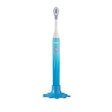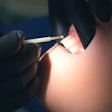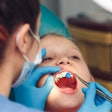
CHICAGO (Reuters), Apr 24 - In a study likely to make school janitors cringe, U.S. researchers said Wednesday that chewing gum may boost academic performance in teenagers.
Many U.S. schools ban chewing gum because children often dispose of the sticky gum under chairs or tables.
But a team led by Craig Johnston at Baylor College of Medicine in Houston found that students who chewed gum during math class had higher scores on a standardized math test after 14 weeks and better grades at the end of the term than students in the class who did not chew gum. The study was funded by chewing gum maker Wrigley.
"For the first time we've been able to show in a real-life kind of situation that students did perform better when they were allowed to chew," said Gil Leveille, executive director of the Wrigley Science Institute, a research arm of Wm Wrigley Jr Co., which is now a part of Mars Inc.
Leveille said Wrigley has gotten feedback from many of its gum customers who say chewing gum helps them stay focused.
So, four years ago the company started the science institute to see if some of these claims have merit.
The researchers at Baylor studied four math classes or 108 students age 13 to 16 years old from a Houston charter school that serves mostly low-income Hispanic students.
About half got free Wrigley's sugar-free gum to chew during class, homework, and tests. They chewed at least one stick of gum 86% of the time they were in math class and 36% of the time they were doing homework.
The other half went without.
After 14 weeks, the gum chewers had a 3% increase in their math scores on the Texas Assessment of Knowledge and Skills achievement test, a small but statistically significant change, according to Johnston and colleagues, who presented their findings at the American Society for Nutrition scientific meeting in New Orleans.
They found no difference in math scores between the two groups in another test called the Woodcock Johnson III Tests of Achievement. However, the gum chewers did get better final grades in the class than their nonchewing peers.
Another Wrigley-funded study found that college students in a lab who were given difficult computer tasks had lower levels of the stress hormone cortisol when they were chewing gum compared to when they were not.
Leveille said he thinks chewing gum helps reduce stress so students can do their best work. And while he is aware that many schools have a dim view of students chewing gum in class, he hopes the findings may change that a bit.
"It's not a matter of chewing. It's a matter of gum disposal," Leveille said, adding that that can be overcome by teaching proper disposal behaviors.
If that fails, he quipped, "We'll have to provide the janitors with scrapers."
By Julie Steenhuysen
Last Updated: 2009-04-23 13:01:09 -0400 (Reuters Health)
Copyright © 2009 Reuters Limited. All rights reserved. Republication or redistribution of Reuters content, including by framing or similar means, is expressly prohibited without the prior written consent of Reuters. Reuters shall not be liable for any errors or delays in the content, or for any actions taken in reliance thereon. Reuters and the Reuters sphere logo are registered trademarks and trademarks of the Reuters group of companies around the world.



















